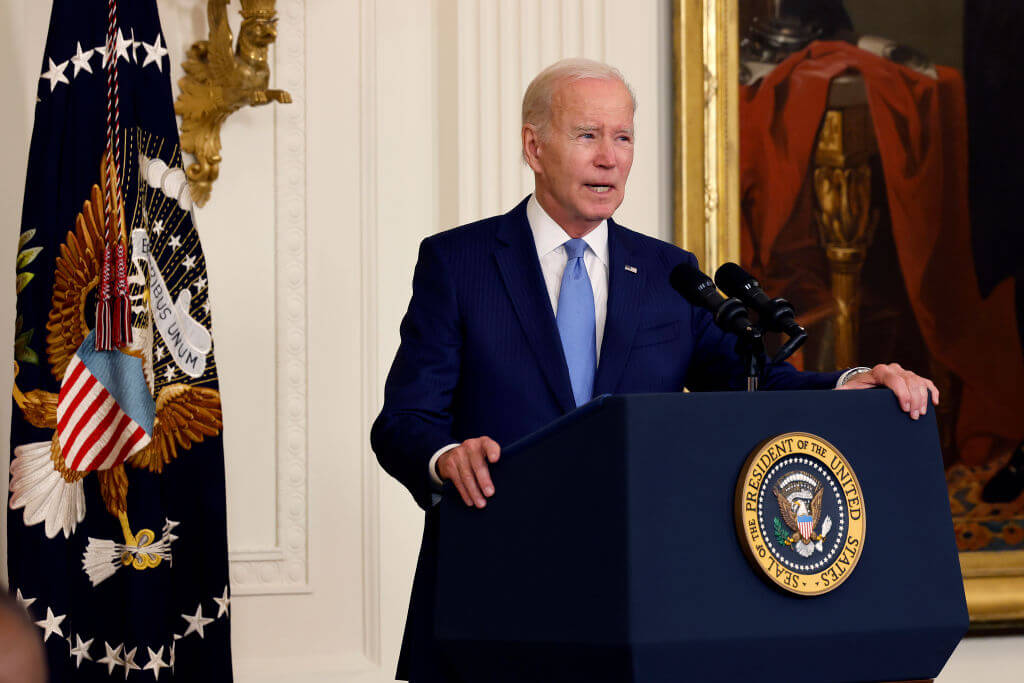‘I have your back’ Biden says on Rosh Hashanah call to Jewish leaders
The president’s call to rabbis and other Jewish leaders is an annual holiday ritual

President Joe Biden on May 17, 2023. Photo by Chip Somodevilla/Getty Images
President Joe Biden sought to assure the American Jewish community ahead of the High Holidays that his administration is committed to their safety as antisemitic threats rise.
“I know you are concerned about security,” Biden said during a High Holiday Zoom conference call with rabbis and other Jewish leaders on Thursday evening, an annual presidential ritual. “I want to make clear to you and to all your congregations, I have your back — committed to the safety of the Jewish people.”
“My administration is going to continue to condemn and combat antisemitism at every turn,” he added.
The president, who is running for reelection next year, hit many of the themes he has incorporated into the scores of speeches he has given to Jewish audiences in past decades and since he has assumed office.
Biden mentioned Israel during his 10-minute statement but not in the context of the judicial overhaul that has prompted hundreds of thousands of Israelis to protest in the streets, and has also alarmed many American Jews in recent months. He alluded to his visit to Israel last year, his meeting with Israeli President Isaac Herzog at the White House and the nomination of Jack Lew, an Orthodox Jew and former Obama administration official, as the next U.S. ambassador to Israel.
Biden is expected to meet with Israeli Prime Minister Benjamin Netanyahu in New York next week.
The call also included a Q&A session with Neera Tanden, Biden’s domestic policy adviser. Tanden succeeded Susan Rice, who headed the White House’s interagency task force that developed the national plan to counter antisemitism.
The plan to fight antisemitism
The president said his administration “has already started aggressively implementing” the plan, which was released in May.
Tanden, speaking later in the call, added detail. Agencies have a May 2024 deadline to complete their assigned tasks, she said. “More than two dozen agencies are producing deliverables,” she said.
She mentioned as examples:
- A letter from Department of Housing and Urban Development “to 200 federally funded housing programs asking them to identify an antisemitism in housing.”
- Research and projects on antisemitism solicited by the National Endowment for the Humanities.
- The resource guides for houses of worship, published by the Department of Justice and Homeland Security.
- Letters from the Department of Education to schools and universities reminding them of their obligation under the 1964 civil rights act to address discrimination claims, with references to more recent enhancements under Presidents Barack Obama and Donald Trump that extend the protections to Jews.
“There’s been a rising concern on campus [about] antisemitism and the strategy really propels passion on the part of the Department of Ed’s Office of Civil Rights to really be aggressive, as aggressive on antisemitism as we are when we look at and investigate other issues of discrimination,” she said.
Tanden appeared to be addressing concerns that the Biden administration would focus particularly on right-wing antisemitism; a number off Jewish organizations have said that the alleged harassment of Jewish students on campuses, which they say often comes from left wing and pro-Palestinian groups, should also be a priority.
Rosh Hashanah receptions
Earlier this week, Vice President Harris and Doug Emhoff, the second gentleman, hosted a pre-Rosh Hashanah reception for some 150 Jewish leaders and celebrities at their residence in Washington, D.C. It continued the poolside tradition Biden, when he was vice president, began at the residence, which is located on the grounds of the U.S. Naval Observatory in Washington. Biden held a pre-Rosh Hashanah event at the White House last year.
On the call, Biden said such gatherings are “important to show the world that we celebrate and protect Jewish Americans, whose values, cultures and contributions shaped the very character of our nation — and I might add — from the very beginning.”
JTA contributed to this report.





















